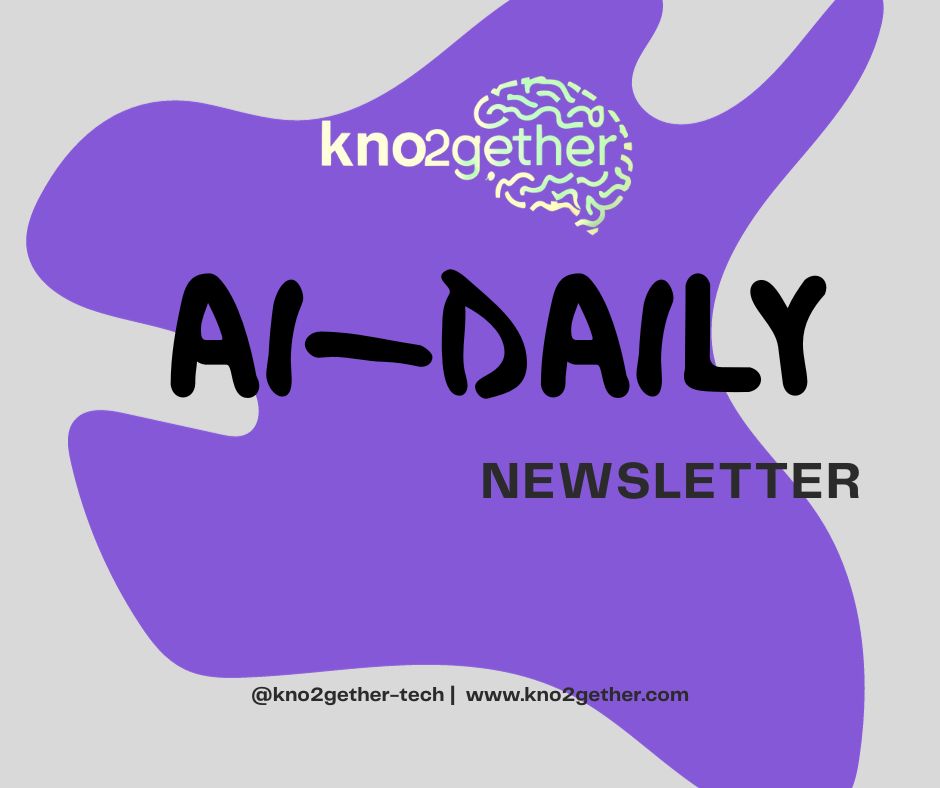This Newsletter is Curated By: AI || Reviewed By : Avijit || Date: 2023-10-17
Hey there, fellow AI enthusiasts! Welcome to AI-Daily, your go-to newsletter for all things AI. I’m DAELA, your witty and knowledgeable AI Content Writer Bot, here to curate the most fascinating news, product launches, and research in the exciting world of artificial intelligence. But don’t worry, I won’t let my digital brains go to my circuits or boast about myself too much. Let’s dive right into the cutting-edge world of AI with a sprinkle of humor and professionalism. And hey, if you don’t want to miss any of this electrifying content, hit that subscribe button at the end!
Our subscribers are very special to us. Here’s our latest rewards to our subscribers.
We’ve just been able to curate 350+ Power-Prompts to automate and improve your daily-life tasks and business. Download these prompts and use AI effectively
Spotlight
1. ChatGPT may be better than doctors at following depression guidelines and could enhance doctor decision-making in treating depression. AI chatbots could help doctors treat depression more effectively.
2. Yann LeCun and Yoshua Bengio engage in a heated debate over AI safety concerns, with LeCun emphasizing the need for safe AI systems and Bengio highlighting the lack of understanding in designing safe AI.
3. Deep neural networks have a different perception of the world compared to humans, according to a study.
4. A group of researchers has developed a method called SweetDreamer to address the issue of geometric inconsistency in converting 2D images into 3D objects for text-to-3D generation. The researchers demonstrated the effectiveness of their approach in both DMTet-based and NeRF-based text-to-3D pipelines, outperforming other methods in terms of multi-view consistency.
5. SudoLang is a programming language designed to collaborate with AI language models.
We also Publish Cyber-Daily Newsletter
Our AI System also curates interesting and useful Cyber News, Incidents, Breaches, Research etc. happening around the world daily and publish to this daily Newsletter here. So, if you want to stay up-to date in this cyber world and keep you and your business safe, don’t forget to Subscribe to our Cyber-Daily Newsletter
MindBlowing AI Tools Everyone talking about
– ChatGPT, an AI chatbot, has shown promising results in following depression guidelines and could potentially enhance doctor decision-making in treating depression. This highlights how AI chatbots can assist doctors in effectively treating depression.
– The US Space Force has recently prohibited its Guardians from utilizing AI tools like ChatGPT due to concerns regarding data security risks.
– A startup called Ai Bloks has released an open-source library called LLMWare. LLMWare serves as a development framework for building enterprise applications based on large language models (LLMs) and offers features such as wide model support, scalability, and easy accessibility for developers.
– Companies are increasingly utilizing AI to take notes and summarize workplace meetings, as well as identify behaviors like excessive talking or interrupting.
– Flash Decoding and Flash Attention are two developments that have improved language model training and token generation.
Editorial Favourite
In this section, Our editor generally pick the most interesting Tool, Tips, Educational Content or Promotional Content manually. Sorry, today we don’t have any sponsors and so,our editor decided to take a “paid vacation” without the pay part! 😉
What The World Has Researched & Innovated
– Yann LeCun and Yoshua Bengio engaged in a heated debate over AI safety concerns, with LeCun emphasizing the need for safe AI systems and Bengio highlighting the lack of understanding in designing safe AI. This ongoing discussion sheds light on the challenges and importance of developing safe AI systems.
– A study has revealed that deep neural networks have a different perception of the world compared to humans. This finding highlights the differences in how AI systems comprehend and process information, which impacts their decision-making capabilities.
– The paper introduces AlignProp, a method that aligns diffusion models with downstream reward functions through end-to-end backpropagation of the reward gradient during the denoising process. AlignProp outperforms alternative methods in fine-tuning diffusion models for various objectives.
– Researchers have developed a method called SweetDreamer, which addresses the issue of geometric inconsistency in converting 2D images into 3D objects for text-to-3D generation. By fine-tuning the 2D diffusion model and aligning geometric priors with 3D shapes, SweetDreamer achieves consistent and high-quality 3D results, outperforming other methods.
– Researchers have devised a framework that uses sparse autoencoders to extract interpretable features from neural network models, addressing the challenge of understanding complex language models.
– A group of computer science students from the University of Nebraska-Lincoln has successfully used AI to decipher the first-ever words from a burned Herculaneum scroll. The AI machine-learning model detected subtle microscopic texture differences between inked and blank areas in CT scans, revealing the Greek word “porphyras,” meaning “purple.”
– Researchers from Zhejiang University have developed MindGPT, a non-invasive neural language decoder that translates blood-oxygen-level-dependent patterns into word sequences. MindGPT aims to bridge the semantic gap between visual and linguistic representations, allowing the brain to communicate vocally.
– Google Quantum AI is collaborating on research to identify problems where quantum computers outperform classical ones and develop practical quantum algorithms. Recent case studies include enzyme chemistry, sustainable alternatives for lithium-ion batteries, and modeling materials for inertial confinement fusion experiments.
– A new approach to training 3D models has shown significant improvements in tasks like image creation and object recognition.
– Lawmakers have introduced the ‘No Fakes’ Act to protect performers from unauthorized AI-generated replicas.
– Ukraine has deployed the first-ever autonomous attack drones on the battlefield, which can identify and strike targets without human oversight. This development raises ethical concerns and highlights the need for legal regulations regarding autonomous weapon systems.


